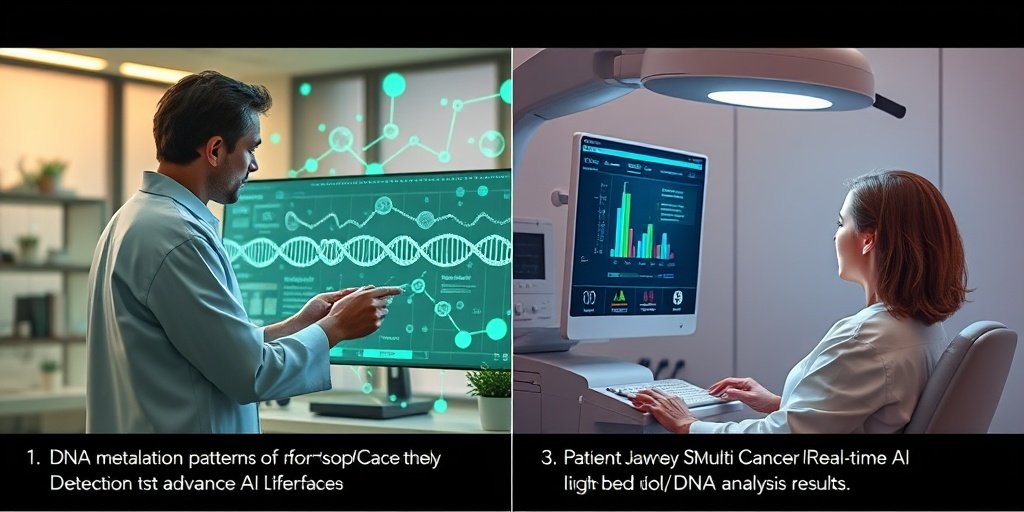⚡ Quick Summary
This review highlights the transformative role of artificial intelligence (AI) in cancer epigenomics, particularly in the analysis of DNA methylation patterns for early cancer detection and precision medicine. The integration of AI technologies is paving the way for advanced Multi-Cancer Early Detection (MCED) tests, enhancing diagnostic accuracy across various cancer types.
🔍 Key Details
- 📊 Focus: Advances in AI applications in cancer epigenomics
- 🧬 Key Biomarker: DNA methylation
- ⚙️ Technologies: Deep learning networks, graph-based models
- 🏆 MCED Tests: GRAIL’s Galleri, CancerSEEK
- 🌍 Challenges: Sensitivity for early-stage cancers, algorithm transparency, validation across populations
🔑 Key Takeaways
- 🧬 DNA methylation is crucial for cancer diagnosis and treatment strategies.
- 🤖 AI and machine learning are revolutionizing the analysis of complex methylation patterns.
- 🏥 MCED tests like Galleri and CancerSEEK are improving diagnostic accuracy.
- 🔍 Early detection is essential for effective cancer treatment and patient outcomes.
- ⚖️ Ethical concerns include data privacy and algorithmic bias.
- 🔄 Future directions involve integrating multi-omics data and developing explainable AI frameworks.
- 🌐 Global impact could lead to earlier detection and more effective treatments worldwide.

📚 Background
Cancer remains one of the leading causes of mortality globally, necessitating innovative approaches for early detection and treatment. DNA methylation, an essential epigenetic modification, plays a pivotal role in regulating gene expression and maintaining genomic stability. Its aberrant patterns are increasingly recognized as valuable biomarkers in cancer research, offering insights into diagnosis, prognosis, and personalized treatment strategies.
🗒️ Study
This review synthesizes recent advancements in the intersection of artificial intelligence and DNA methylation profiling. It explores how AI-driven methodologies are transforming clinical practices by enabling rapid and high-resolution analysis of methylation patterns, which is crucial for early cancer detection and accurate classification.
📈 Results
The integration of AI technologies has led to significant improvements in the development of MCED tests, enhancing diagnostic accuracy across diverse cancer types. However, challenges remain, particularly regarding the sensitivity of these tests for early-stage cancers and the need for validation across various populations to ensure equitable implementation.
🌍 Impact and Implications
The findings from this review underscore the potential of AI-powered epigenetic diagnostics to revolutionize cancer care. By enabling earlier detection and more effective treatments, these advancements could significantly improve patient outcomes on a global scale. The synergy between AI and epigenomics is set to redefine cancer diagnostics and therapy, making it a promising area for future research and development.
🔮 Conclusion
This review highlights the incredible potential of artificial intelligence in advancing cancer epigenomics. By harnessing the power of AI and machine learning, we can achieve earlier detection and more personalized treatment strategies, ultimately leading to improved patient outcomes. The future of cancer diagnostics and therapy looks promising, and continued research in this field is essential for overcoming existing challenges.
💬 Your comments
What are your thoughts on the integration of AI in cancer diagnostics? We would love to hear your insights! 💬 Leave your comments below or connect with us on social media:
Artificial Intelligence in cancer epigenomics: a review on advances in pan-cancer detection and precision medicine.
Abstract
DNA methylation is a fundamental epigenetic modification that regulates gene expression and maintains genomic stability. Consequently, DNA methylation remains a key biomarker in cancer research, playing a vital role in diagnosis, prognosis, and tailored treatment strategies. Aberrant methylation patterns enable early cancer detection and therapeutic stratification; however, their complex patterns necessitates advanced analytical tools. Recent advances in artificial intelligence (AI) and machine learning (ML), including deep learning networks and graph-based models, have revolutionized cancer epigenomics by enabling rapid, high-resolution analysis of DNA methylation profiles. Moreover, these technologies are accelerating the development of Multi-Cancer Early Detection (MCED) tests, such as GRAIL’s Galleri and CancerSEEK, which improve diagnostic accuracy across diverse cancer types. In this review, we explore the synergy between AI and DNA methylation profiling to advance precision oncology. We first examine the role of DNA methylation as a biomarker in cancer, followed by an overview of DNA profiling technologies. We then assess how AI-driven approaches transform clinical practice by enabling early detection and accurate classification. Despite their promise, challenges remain, including limited sensitivity for early-stage cancers, the black-box nature of many AI algorithms, and the need for validation across diverse populations to ensure equitable implementation. Future directions include integrating multi-omics data, developing explainable AI frameworks, and addressing ethical concerns, such as data privacy and algorithmic bias. By overcoming these gaps, AI-powered epigenetic diagnostics can enable earlier detection, more effective treatments, and improved patient outcomes, globally. In summary, this review synthesizes current advancements in the field and envisions a future where AI and epigenomics converge to redefine cancer diagnostics and therapy.
Author: [‘Sahoo K’, ‘Lingasamy P’, ‘Khatun M’, ‘Sudhakaran SL’, ‘Salumets A’, ‘Sundararajan V’, ‘Modhukur V’]
Journal: Epigenetics Chromatin
Citation: Sahoo K, et al. Artificial Intelligence in cancer epigenomics: a review on advances in pan-cancer detection and precision medicine. Artificial Intelligence in cancer epigenomics: a review on advances in pan-cancer detection and precision medicine. 2025; 18:35. doi: 10.1186/s13072-025-00595-5